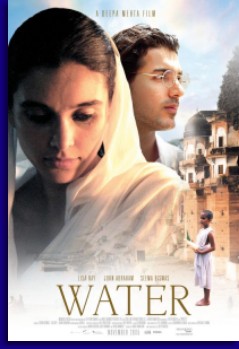

Reviewed by
Christopher Armstead

The third installment of Deepha Mehta’s trilogy of the various forms of oppression in India, with the first two being ‘Fire’ and ‘Earth’, ‘Water’ tells the tragic story of the widows of India and the brutal oppression they suffered before the old norms where done away with, or at least revised.
Set in the 1930’s during the time of Mahatma Gandhi’s rise to prominence, we are introduced to 8-year old Chuyia (Ronica Sajnani Sarala) whose future husband, a man she has never met, has died and as such, she is summarily shipped off to an ashram for widows where she is to spend the rest of her life. As we learn in the film, when a woman’s husband dies in India during this time, she has the choice of burning along with her dead mate, hoping that his younger brother might take her, or living a life of personal denial. I’m looking for a ‘none of the above’ option, but apparently that was not a choice back then.
Chuiya is obviously dismayed at what she could have possibly done to be ripped from her parents home, have her head shaved and shipped of to a hovel to live with all of these strange women, becomes quite belligerent and rebellious. But she is soon calmed down by the beautiful widow Kalyani (Lisa Ray) who shows Chuiya great kindness and compassion as she’s been at the ashram since she was nine years old and helps the child adjust to this sudden change in her life. Kalyani soon meets the handsome Narayana (John Abraham) a progressive thinking young lawyer from a different caste system who eventually falls in love the widow and wishes to marry her. This forbidden relationship causes shockwaves in Narayana’s household and is further complicated when it becomes known that Kalyani is being prostituted by the head widow of the ashram.


Why do we go to movies? To be entertained? Is ‘Water’ entertaining? No, not really. ‘Big Top Pee-wee’ is entertaining. But this is still a very good and powerful film. Ms. Mehta has presented a film that is brutal in it’s honesty and shocking in the realism of its depictions. Since I am unfamiliar with history of 1930’s India I am at the mercy of the manipulations of the filmmaker, and she has effectively manipulated me into outrage. The treatment of these women is nothing short of barbaric, but is wholly accepted to the point of nonchalance. This film, which is beautifully shot on what I’ve read is a limited budget, is a tragedy almost completely devoid of melodrama. Even is scenes where I believe some dramatic response from the cast would be necessary, it is ominously absent in that the horror is greeted by acceptance.
Seema Biswas who portrays the Shakuntala, the longing, spiritual, middle aged widow who struggles with the conflict of the accepted ways and wishing change for the child Chuiya and the whore Kalyani gives a remarkable performance. But leads Lisa Ray and John Abraham, though model pretty, have an extremely limited and stifled acting range. They are barely believable as passionate lovers and unfortunately their performances bring the movie down a notch.
Overall, this a very
powerful and moving film and shouldn’t be missed if you
are fortunate to have come to your art house in the near
future.

